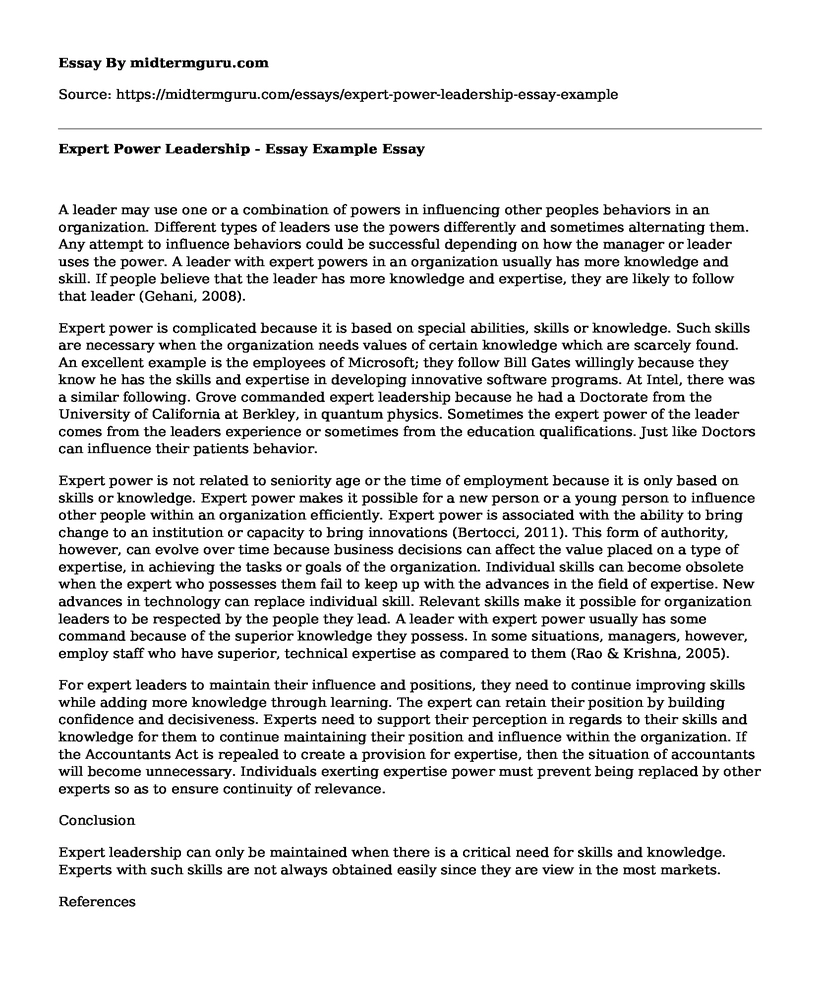A leader may use one or a combination of powers in influencing other peoples behaviors in an organization. Different types of leaders use the powers differently and sometimes alternating them. Any attempt to influence behaviors could be successful depending on how the manager or leader uses the power. A leader with expert powers in an organization usually has more knowledge and skill. If people believe that the leader has more knowledge and expertise, they are likely to follow that leader (Gehani, 2008).
Expert power is complicated because it is based on special abilities, skills or knowledge. Such skills are necessary when the organization needs values of certain knowledge which are scarcely found. An excellent example is the employees of Microsoft; they follow Bill Gates willingly because they know he has the skills and expertise in developing innovative software programs. At Intel, there was a similar following. Grove commanded expert leadership because he had a Doctorate from the University of California at Berkley, in quantum physics. Sometimes the expert power of the leader comes from the leaders experience or sometimes from the education qualifications. Just like Doctors can influence their patients behavior.
Expert power is not related to seniority age or the time of employment because it is only based on skills or knowledge. Expert power makes it possible for a new person or a young person to influence other people within an organization efficiently. Expert power is associated with the ability to bring change to an institution or capacity to bring innovations (Bertocci, 2011). This form of authority, however, can evolve over time because business decisions can affect the value placed on a type of expertise, in achieving the tasks or goals of the organization. Individual skills can become obsolete when the expert who possesses them fail to keep up with the advances in the field of expertise. New advances in technology can replace individual skill. Relevant skills make it possible for organization leaders to be respected by the people they lead. A leader with expert power usually has some command because of the superior knowledge they possess. In some situations, managers, however, employ staff who have superior, technical expertise as compared to them (Rao & Krishna, 2005).
For expert leaders to maintain their influence and positions, they need to continue improving skills while adding more knowledge through learning. The expert can retain their position by building confidence and decisiveness. Experts need to support their perception in regards to their skills and knowledge for them to continue maintaining their position and influence within the organization. If the Accountants Act is repealed to create a provision for expertise, then the situation of accountants will become unnecessary. Individuals exerting expertise power must prevent being replaced by other experts so as to ensure continuity of relevance.
Conclusion
Expert leadership can only be maintained when there is a critical need for skills and knowledge. Experts with such skills are not always obtained easily since they are view in the most markets.
References
Bertocci, R. L. (2011). Understanding management. Mason, OH: South-Western Cengage Learning.
Daft, R. L., & Lane, P. G. (2008). The leadership experience. Mason, OH: Thomson/South-
Gehani, R. R. (2008). Management of technology and operations. New York [u.a.: J. Wiley.
Top of FormRao, V. S. P., & Krishna, H. V. (2005). Management: Text and Cases. New Delhi: Excel Books. Western.
Cite this page
Expert Power Leadership - Essay Example. (2021, May 24). Retrieved from https://midtermguru.com/essays/expert-power-leadership-essay-example
If you are the original author of this essay and no longer wish to have it published on the midtermguru.com website, please click below to request its removal:
- Culture, Climate, and Ethics in a Company - Paper Example
- Essay on Joint Application Development (JAD)
- Articles Analysis Essay on Transformational Leadership
- Empowering Employees: Strategies for Leader Success - Essay Sample
- Cultural Qualities and CSR: Exploring Sao Paulo, Brazil and Shenzhen, China - Essay Sample
- Leaders: Avoid Communication Missteps to Nurture Organizational Growth - Essay Sample
- Leadership: Key to Success in a Competitive World - Essay Sample







